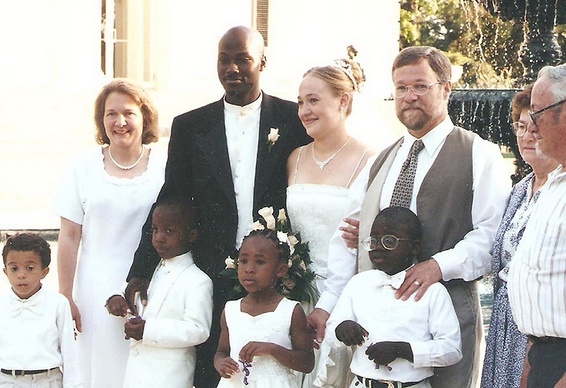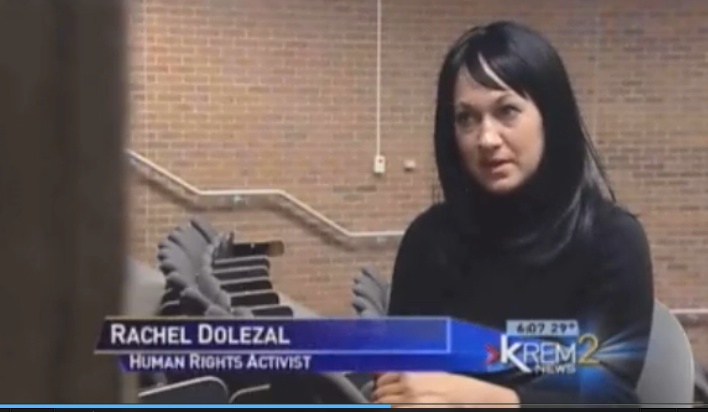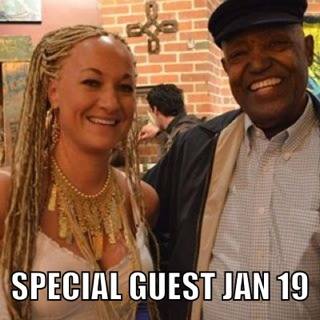NEWS: The racial identity of civil rights leader and Spokane-based NAACP leader Rachel Dolezal has been called into question.
On 11 June 2015, Spokane NAACP president Rachel Dolezal (seen in the photograph above as she looks today, and as she appeared as younger woman) shot to popularity on blogs and news sites across the United States due to her an assertion by her parents that their daughter was of entirely white heritage and had been misrepresenting her race.
Dolezal's racial identity was called into question largely because of an article published in the Spokane, Washington, Spokesman-Review on 11 June 2015. In that article (titled "Credibility of local NAACP leader Rachel Dolezal questioned"), Dolezal's mother Ruthanne accused her daughter of masquerading as a black woman:
Rachel Dolezal, 37, is the head of the local chapter of the NAACP and has identified herself as at least partly African-American. But her Montana birth certificate says she was born to two Caucasian parents, according to that couple."We are her birth parents," Lawrence Dolezal said. "We do not understand why she feels it's necessary to misrepresent her ethnicity."
Dolezal’s mother, Ruthanne Dolezal, said that she has had no contact with her daughter in years. She said her daughter began to “disguise herself” in 2006 or 2007, after the family had adopted four African-American children and Rachel Dolezal had shown an interest in portrait art.
“It’s very sad that Rachel has not just been herself,” Ruthanne Dolezal said. “Her effectiveness in the causes of the African-American community would have been so much more viable, and she would have been more effective if she had just been honest with everybody.”
Dolezal (whose earlier evasive answers to direct questions about her race were also quoted) said her mother's allegations were motivated by an unrelated familial dispute:
Rachel Dolezal dismisses the controversy as little more than an ugly byproduct of contentious litigation between other family members over allegations of past abuse that has divided the family. She’s particularly suspicious of the timing, noting that the allegations broke on her son’s birthday and come as the Colorado lawsuit filed by her sister against their brother nears a key juncture.
In particular, the article paraphrased Ruthanne Dolezal as saying that "while the family has long been aware of some of their daughter’s racial and ethnic claims in the Inland Northwest," they had refrained from making any comment about the situation until they were contacted by the news media. (The Inland Northwest refers to a portion of Washington State and Idaho.)
Dolezal's parents also shared a photograph dated 21 May 2000, from their daughter's wedding to a man named Kevin. Additional information about Dolezal's marriage (and the current status of her husband) was not included:

Dolezal's name has popped up in news stories about race and controversy as far back as September 2009. A Northwest Cable News (NWCN) article dated 30 September 2009 reported that Dolezal was the victim of both race-based harassment (after discovering a noose on her porch) as well as a robbery (during which guns were purportedly taken from her home). In that article, Dolezal was identified in the article as Education Director of the Human Rights Education Institute in Coeur d'Alene, Idaho:
Rachel Dolezal found a noose on her front porch last Sunday at her Spokane home.Dolezal says she wasn't surprised or angry when she made the discovery, just disappointed, and it's not the first time she and her organization have been targeted.
In April, a group of neo-Nazis came to the institute and among other things, repeatedly asked where she lived.
Just last week, her home was burglarized. One of the things taken, a gun she bought after that April encounter; and now this noose.
Allegations levied by Dolezal were also the focus of a 22 June 2010 Spokesman-Review article titled "Unfurling banners of racial tolerance." That piece referenced Dolezal's 16-year-old brother and eight-year-old son with the phrase "both of whom are black." (An 11 June 2015 BuzzFeed article was among several asserting that Dolezal had begun to claim biological parentage for one or more of her adopted black siblings, but that claim has yet to be fully substantiated.)
Dolezal's subsequent resignation from her position at the Human Rights Education Institute in Coeur d'Alene was also the subject of a 28 July 2010 Spokesman-Review article. In that report, Dolezal described her resignation as "forced ... for all intents in purposes," hinting that she was passed over for a promotion due to unspecified discrimination:
Dolezal said she wrote the institute’s board of directors two weeks ago seeking to be named executive director. She also submitted her letter of resignation, contingent on the board refusing her promotion ... Instead of promoting Dolezal, the board named its new development director Dan Lepow as executive director and accepted Dolezal’s resignation.The Coeur d’Alene Press reported that Dolezal said she was the target of discrimination, but Dolezal declined to discuss this allegation with The Spokesman-Review.
[Board president Marilyn] Muehlbach said Dolezal’s allegations came as a surprise.
“That’s nothing we talked about at all,” Muehlbach said.
An article published by Spokane television station KREM on 22 February 2011 included both video and comment from Dolezal about a then-current incident involving a "sophisticated bomb ... found along the route of the Martin Luther King Jr. Day parade" in Spokane that year. A still taken from the video showed a portion of it in which Dolezal spoke about the incident and was clearly identified on the screen:

Dolezal begins speaking in the clip shortly after the 0:40 second mark:
The footage seen above (in which Dolezal appears to be white) was filmed in Spokane in early 2011, but a 21 June 2010 post on the Boise Weekly web site described Dolezal as black in a commentary about the alleged incident involving the noose. A 23 June 2010 comment left on the Boise Weekly web page by a reader using the handle "justsoyaknow" criticized that post for describing Dolezal as black:
George, do a little research. There is something intrinsically wrong when a white woman tries to pass herself off as "black." How in the world can she expect justice to be served when she cannot tell the truth about her own ethnicity? Her parents are white, her grandparents are white, she is white.
A number of comments published to a July 2010 article on CDApress.com similarly accused Dolezal of fabricating her racial identity. A reader using a similar name to the commenter on Boise Weekly made a similar allegation in a July 2010 comment:
The people who have known Rachel for years do not like seeing her fraudulently passing herself off as "black" for the sake of "the cause." Honestly, it really wouldn't have taken Ms Dolan much research at all to find out her true ethnicity. Has anyone just asked her? Or do all who assume she's "black" wish to believe she is "black?" I have no reason to make this up, niether do the others. I have no idea who the others are, but we do agree on the fact Rachel Dolezal is a bonafide white woman. Everyone is entitled to their opinion, but it is better to form an "informed" opinion. If you don't believe us just ask her.
Dolezal was quoted in a February 2010 New York Times article about the Tea Party, and was described by the paper as "multiracial."
The social media trail traversed by news sleuths also led to a 14 January 2015 Facebook post published by the Spokane chapter of the NAACP (of which Dolezal had just become president), which featured a photograph of Dolezal alongside a black man along with the notation that "President Dolezal's father announced today that he will be coming to town for the January 19th ribbon-cutting ceremony for the NAACP office." The post suggested to viewers that the man in the photograph was Dolezal's father, but Larry Dolezal, the man quoted in June 2015 interviews alongside Ruthanne Dolezal, is white. The name of the man seen in the NAACP's photograph (perhaps her father-in-law) was not included in the Facebook post:

On 11 June 2015, the Spokesman-Review published a separate article titled "Credibility of local NAACP leader Rachel Dolezal questioned" which included a joint statement made by Spokane Mayor David Condon and Council President Ben Stuckart regarding the controversy:
We are gathering facts to determine if any city policies related to volunteer boards and commissions have been violated. That information will be reviewed by the City Council, which has oversight of city boards and commissions.
Among those persons quoted in the piece was Kurt Neumaier, alternate board member of the Human Rights Education Institute in Coeur d'Alene, the organization from which Dolezal resigned in July 2010. Neumaier aired long-held suspicions he harbored about Dolezal's credibility, particularly in relation to incidents in which she claimed she was racially targeted:
Neumaier said he was suspicious of several incidents Dolezal reported in Coeur d’Alene, including her discovery of a swastika on the door of the Human Rights Education Institute when the organization’s security camera was “mysteriously turned off.”“None of them passed the smell test ... In all of these incidents (she reported in Coeur d’Alene), she was the sole witness to events that, when put under scrutiny, don’t hold up,” he said.
According to the paper, none of a number of complaints made by Rachel Dolezal about racial targeting has ever resulted in an arrest or charges against any other party.
On 12 June 2015, the NAACP issued a press release supportive of Dolezal, saying that racial identity is not a criterion for NAACP leadership:
For 106 years, the National Association for the Advancement of Colored People has held a long and proud tradition of receiving support from people of all faiths, races, colors and creeds. NAACP Spokane Washington Branch President Rachel Dolezal is enduring a legal issue with her family, and we respect her privacy in this matter. One’s racial identity is not a qualifying criteria or disqualifying standard for NAACP leadership. The NAACP Alaska-Oregon-Washington State Conference stands behind Ms. Dolezal’s advocacy record. In every corner of this country, the NAACP remains committed to securing political, educational, and economic justice for all people, and we encourage Americans of all stripes to become members and serve as leaders in our organization.Hate language sent through mail and social media along with credible threats continue to be a serious issue for our units in the Pacific Northwest and across the nation. We take all threats seriously and encourage the FBI and the Department of Justice to fully investigate each occurrence.
Later in the day on 12 June 2015, the blog Jezebel quoted Shannon Washington. Washington claimed to be a former student of Dolezal's at historically black Howard University in the early '00s. Washington said that during her time there, Dolezal presented as white:
“She was a good teacher and never came off as ‘trying’ to be black to me,” said Washington. “She was Rachel, a white woman who could paint really well. She painted Black people but, being at Howard, I saw it as her painting the world around her. No one asked about her ethnicity because we didn’t need to. No one assumed she was black.”
Another individual speaking on the condition of anonymity claimed to be at Howard while Dolezal was there, and recalled her as "white" with "straight, blonde hair."
Update, 15 June 2015: On 15 June 2015, Rachel Dolezal issued her first statement about the controversy via the Facebook page of the Spokane NAACP. In it, Dolezal said:
It is with complete allegiance to the cause of racial and social justice and the NAACP that I step aside from the Presidency and pass the baton to my Vice President, Naima Quarles-Burnley. It is my hope that by securing a beautiful office for the organization in the heart of downtown, bringing the local branch into financial compliance, catalyzing committees to do strategic work in the five Game Changer issues, launching community forums, putting the membership on a fast climb, and helping many individuals find the legal, financial and practical support needed to fight race-based discrimination, I have positioned the Spokane NAACP to buttress this transition.
Dolezal's full statement (which did not address allegations about her race specifically) can be read here. In it, she stated that "a separation of [her] family and organizational outcomes is in the best interest of the NAACP."
